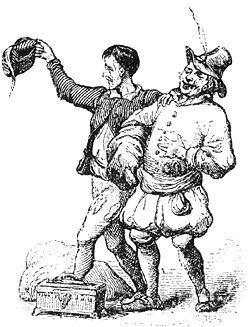From Wikipedia, the free encyclopedia
"The Emperor's New Clothes" (Keiserens nye Klæder) is a fairy tale by Danish poet and author Hans Christian Andersen about an emperor who unwittingly hires two swindlers to create a new suit of clothes for him. The tale was first published in 1837 as part of Eventyr, fortalte for Børn (Fairy Tales, Told for Children).
The tale is one of Andersen's most popular. It appears often in selected tales collections of his work and is frequently published in illustrated storybook editions for children. The tale has seen adaptations in animated film, and television drama.
[edit] Plot summary

Vilhelm Pedersen illustration.
An emperor who cares too much about clothes hires two swindlers who promise him the finest suit of clothes from the most beautiful cloth. This cloth, they tell him, is invisible to anyone who was either stupid or unfit for his position. The Emperor cannot see the (non-existent) cloth, but pretends that he can for fear of appearing stupid; his ministers do the same. When the swindlers report that the suit is finished, they dress him in mime. The Emperor then goes on a procession through the capital showing off his new "clothes". During the course of the procession, a small child cries out, "But he has nothing on!" The crowd realizes the child is telling the truth. The Emperor, however, holds his head high and continues the procession.
[edit] Adaptations

Vilhelm Pedersen illustration
The story has been parodied numerous times, including one story in the animated television series Alftales where Alf plays a frustrated tailor of comfortable casual clothes who pulls the trick on the uninterested emperor who refused his usual goods. At the end, when the emperor's pretension is exposed by a girl who makes some sarcastic comments about his state of undress, Alf's character supplies the ruler some of his usual wares which the emperor finds agreeable. However, the story ends with the emperor making the best of his humiliation by indulging in his one opportunity to go streaking.
The Emperor's New Clothes is the title of a fanciful 2001 film starring Ian Holm as Napoleon, and a 1996 play by playwright Eric Coble.
The 1990 song "The Emperor's New Clothes" by recording artist Sinéad O'Connor has the same general message as the original fairytale. The song ends with the lines, "through their own words / they will be exposed / they've got a severe case of / the emperor's new clothes."
In the 1952 film musical Hans Christian Andersen based on the life of the Danish poet and story-teller Hans Christian Andersen, starring Danny Kaye, the story of The Emperor's New Clothes is told in The King's New Clothes as one of the film's eight songs.
In The Romans, a 1965 episode of Doctor Who, the Doctor convinces Emperor Nero that he can play the lyre by announcing before his performance that "the music is so soft, so delicate, that only those with keen, perceptive hearing will be able to distinguish this melodious charm of music". He then pretends to play, making no actual sound, and at the end of his performance he receives cheers and applause from the other guests at the banquet. He later boasts to one of his companions that he gave the idea to Hans Christian Andersen.
The tale itself was adapted as an episode of the 2008 series Fairy Tales.
An episode in the fourth series of the British TV show Hustle, A Designer's Paradise, bases a confidence trick around the story of The Emperor's New Clothes.
The Emperor's New Mind by Roger Penrose is a book about physics and complexity theory. Penrose concludes that computers, although they appear to think, cannot think as we experience it. He attempts to prove this hypothesis by examining all physics as we know it in a small amount of detail.
The novel Naked Empire by Terry Goodkind makes an allusion to the tale with its title and the book deals with similar themes.
Another book that alludes to the tale is "The Empire's Old Clothes: What the Lone Ranger, Babar, and Other Innocent Heroes Do to Our Minds," by Ariel Dorfman, the Chilean novelist, playwright, essayist, academic, and human rights activist.
The Chinese novelist Ye Sheng Tao continued the story which Andersen had left off; it is also titled, The Emperor's New Clothes.
The PBS series Sagwa also aired an adaptation of this classic tale.
[edit] Cultural references
- The Barenaked Ladies included the lyrics "I felt a chill because I was still wearing the emperor's new clothes" in the song "The Humour of the Situation".
- The games The Legend of Zelda: The Wind Waker and The Legend of Zelda: The Phantom Hourglass contains a similar item called "Hero's New Clothes," a set of clothes that does not actually exist.
- Malaysian Prime Minister Abdullah Ahmad Badawi tried out a T-shirt at the opening of a boutique in Kuala Lumpur named "The Emperor's New Clothes".
- The title of the animated film The Emperor's New Groove comes from this fairytale.
- The book The Emperor's New Clothes: An (Un)popular Account of the Origins of Christianity by Bill Johnston published in 2008 examines the pagan content of Christianity, and casts doubt on the reliability of the New Testament accounts.
[edit] See also
[edit] References
[edit] External links
Wikisource has original text related to this article: